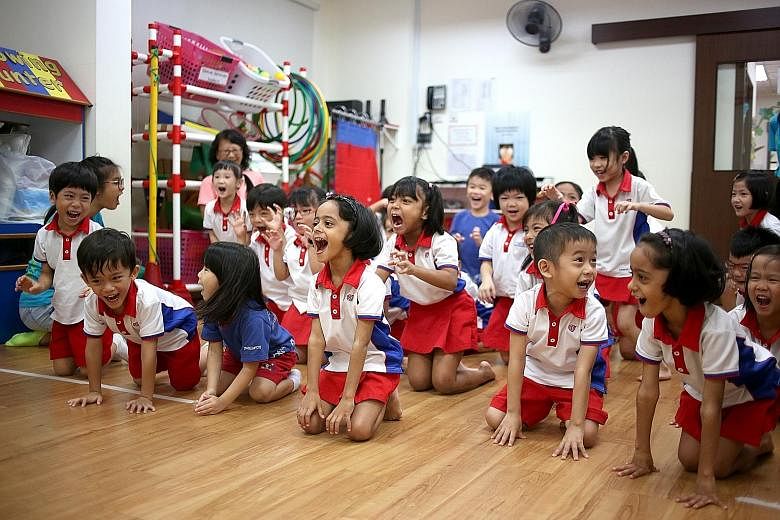Social scientists' understanding of how Singaporean children develop in their early years will get a boost, with a new $8.5 million national study that will begin soon.
About 5,000 families with children aged six and younger will be surveyed next year and in 2020 by National University of Singapore (NUS) professor Jean Yeung.
She will look at how factors such as early childcare, pre-school attendance, the use of technology and family stress can shape child development and family resilience.
The project is one of a dozen to be funded by the Social Science Research Council, which announced the full list yesterday.
The council was set up in January last year to promote social science and humanities research.
Its 12 chosen studies range from racial biases in children to coping strategies in low-income families.
This first batch was chosen from 70 applications seeking the council's grant for studies addressing future needs in Singapore and Asia.
The applications, submitted by seven institutions between May and August last year, covered the broad themes of social integration, innovation and human development. The council will call for a second round of proposals from May 8 to July 28. It will also accept proposals that look at how new digital technologies affect society.
The grant is part of the Ministry of Education's (MOE's) $350 million drive from last year to 2020 to boost social science research.
Of that amount, MOE set aside $50 million until 2020 for research grants, and around $21 million has been committed.
The council's deputy chairman Chan Heng Chee, an ambassador- at-large and a political scientist, said: "Social sciences in Singapore has traditionally not been given the same emphasis as the hard sciences, but it's getting it now."
Council chairman and former civil service head Peter Ho said: "New and complex challenges confront Singapore as it progresses and matures as a nation."
-
Projects to be funded by Social Science Research Council
PROJECTS BETWEEN $100,000 AND $1 MILLION
1 Christianity in South-east Asia: Comparative growth, politics and networks in urban centres. Dr Terence Chong, ISEAS - Yusof Ishak Institute
2 Develop a contemporary theory of harmony. Professor Li Chenyang, NTU
3 Fostering harmonious intergroup relations in early childhood. Assistant Professor Setoh Pei Pei, NTU
4 Identifying positive adaptive pathways in low-income families in Singapore. Associate Professor Esther Goh, NUS
5 Influence of social motivations on cultural learning, adjustment and integration. Associate Professor Krishna Savani, NTU
6 Making identity count in Asia: Identity relations in Singapore and its neighbourhood. Professor Ted Hopf, NUS
7 Population ageing, old age labour and financial decisions in Singapore. Associate Professor Liu Haoming, NUS
8 Salutogenic Healthy Ageing Programme Embracement (Shape) for elderly living alone. Assistant Professor Wang Wenru, NUS
9 Singapore's Islamic studies graduates: Their role and impact in a plural society. Dr Norshahril Saat, ISEAS - Yusof Ishak Institute
PROJECTS BETWEEN $1 MILLION AND $10 MILLION
10 Building human capacity in Singapore's population: Testing innovations in human development . Professor Jean Yeung, NUS
11 Service Productivity and Innovation Research Programme (Spire). Professor Ivan Png, NUS
12 Sustainable governance of transboundary environ- mental commons in S-E Asia. Professor David Taylor, NUS
He cited providing for an ageing population, preserving social mobility, and building a sense of belonging in a globalised world as some of the pressing challenges.
"Social science and humanities research can help us understand and address these issues better," said Mr Ho, who is a senior adviser to the Centre for Strategic Futures.
Professor Yeung's early childhood development study will also carry out smaller projects relevant to Singapore, such as a study of the cultural habits of mixed-race children.
Her proposal is one of three large-scale ones that will receive between $1 million and $10 million of funding over three to five years. The other two projects are about productivity and transboundary haze.
The remaining nine fall under a lower tier of funding - between $100,000 and $1 million for up to three years.
One of them is NUS social work academic Esther Goh's $800,000 study on the effect of redistributive policies on low-income families.
She will look at how financial stress affects parents and, in turn, how socially adjusted and healthy their children are, and how well the children do in school.
She will interview 800 families in three phases, and look at how families help themselves rise above their socio-economic situation over time.
"We hope that this study will help Singaporeans shift away from the problem-centred stereotype of low-income families and recognise that while they may be in dire straits and have many struggles, they have hidden strengths as well," she said.
Nanyang Technological University psychologist Setoh Pei Pei will get $660,000 to investigate how children in Singapore develop racial biases.
She will, for instance, record how fast children associate positive and negative attributes with faces of people of their own race versus faces of another race.
Dr Setoh is also working with pre-school chain NTUC First Campus on a racial and religious harmony curriculum for kindergarten children. The pilot study will begin early next year, she said.


